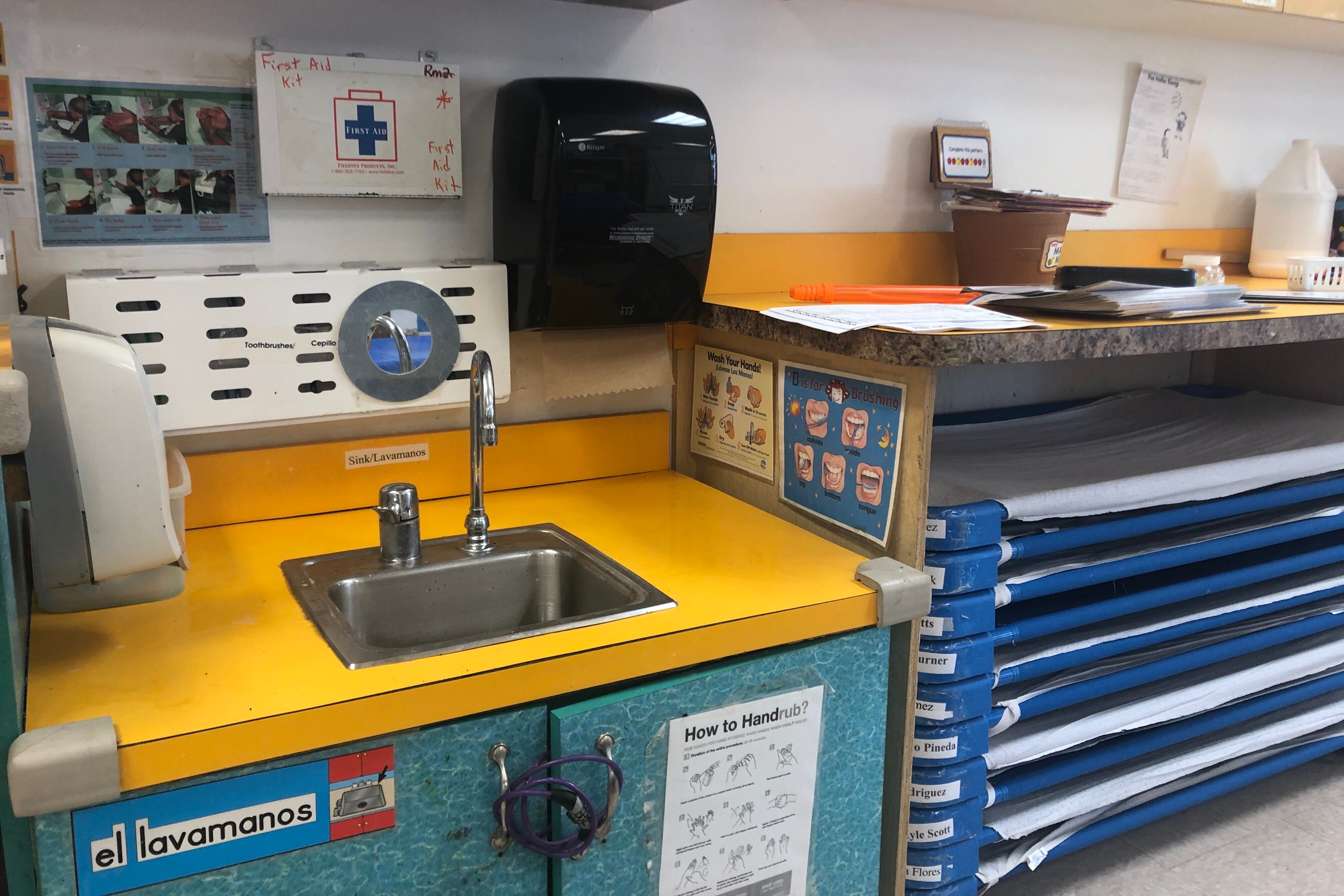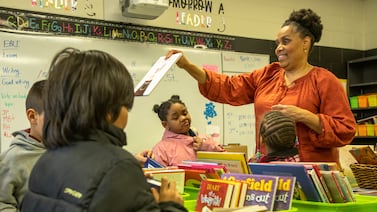Questions from families lit up the chat box at a recent virtual town hall for the Carole Robertson Center for Learning, a nonprofit with campuses in Little Village and North Lawndale.
“My son has a rough time with transitions and this is a really big one,” one parent typed. “Will there be support staff to help him through it?”
“I work in a hospital,” another typed, expressing concern that the new hours were too short.
What precautions were staff taking to keep children safe? How often did the center deep clean? Could parents still bring a child who had a cold?
Despite reassurances, “the decision didn’t come easy,” said Janessa Exkano, a parent of a 1- year-old boy, Aairyon, and a 4-year-old girl, Amiyrah, at the center. Two things ultimately tipped the scales. One was her recall of educators’ pre-pandemic vigilance for handwashing and sending sick children home. The other was her need to juggle her own schooling and part-time job as an Instacart driver, with her husband’s job at a moving company.
“We live in an economy that is not the best, we needed that second income,” she said.
Preschools and child care centers are rushing to reassure parents and anxious staff as children return to child care in Chicago and throughout Illinois. All but an estimated 15% of the state’s child care centers closed during the state’s emergency stay-at-home order. Now the remaining campuses have the green light to reopen — with tight restrictions on class sizes, staffing, and safety precautions — and many are treading cautiously, often with long lists of rules and shorter hours. They are hosting virtual town halls, posting video tours on Facebook explaining why teachers are wearing face shields and rearranging classrooms, and calling and surveying parents to see who’s coming back and when.
At Carole Robertson Center, among the city’s largest early learning organizations, the first 140 students returned Monday to campuses in North Lawndale and Little Village, with another wave expected in early July. As health officials have learned more about the coronavirus and guidelines have shifted, the center has had to write and rewrite its list of new protocols, said Bela Mote, the chief executive officer of the organization.
Previewing the latest safety measures for parents at the recent virtual town hall, Mote reassured parents. “Please remember one thing,” she said, “your child’s safety is No. 1 for us.”
She’s had to reassure staff, too, even though 80% of her teachers said they were sure about coming back to work in a late May survey — and all but 2% returned this week. The center held two weeks of simulations to help teachers learn the new rules and figure out new classroom layouts and routines.
There’d been deep discussions about how to help young children through the stress of a pandemic, protests, and long interruptions of routine. And not just the children — the staff too.
“Teachers are excited to get back to the classroom, but there’s some anxiety about how the first day will go,” said David Walker, the center’s senior director of mental health, who has been meeting with staff weekly on Zoom calls. He’s gearing up to offer his services to families. “We’ve been talking about how we have to fill our own cups up so we can fill up the cups of our students.”
Walking through the North Lawndale campus last week, Sonja Crum Knight, the organization’s vice president, explained the myriad changes interrupting the typical rites of preschool and child care. Instead of group circle time, teachers will facilitate more small groups and play centers for children. One problem the staff had to tackle before reopening was how to set up classrooms to create distance between children.
For now, children must wear masks to enter and exit the building. Staff wear them at all times.
Shared family-style meals, a hallmark of the center’s emphasis on building independent skills, are also scrapped — students will get pre-packaged lunches. Soft costumes in dramatic play areas have been swapped for easier-to-clean items, such as hats and shoes.
In training sessions, early educators talked about balancing a long list of safety precautions with the well-being of children.
“Whatever fear we’ve had in the last three months, we don’t want to create an environment of fear for our families,” Crum Knight said.
Still, families noticed the changes right away. On Monday, instead of walking their children to classrooms, parents stopped at one of three check-in kiosks near the door, where both adult and child were scanned with a digital thermometer and asked to wash hands. Once the temperatures were logged, a teacher whisked the youngster down the hallway.
For Exkano, the biggest adjustments are the shorter hours and rules that limit pickup and dropoff to one parent, which minimizes the number of people coming and going. Factor in the commute with an 8:30 a.m. dropoff and a pickup by 4:30 p.m., and you don’t get a full workday. She hopes that’s just temporary. “Things will change, things will lessen,” she said. “As a parent right now, we just have to be calm and work with what we can.”
Meanwhile, her children appeared to be taking changes in stride. Aairyon was a little skeptical at dropoff, she said, but Amiyrah barely noticed the new routines. “She was ready to go back to school months ago,” Exkano said. “She was happy to be there.”







